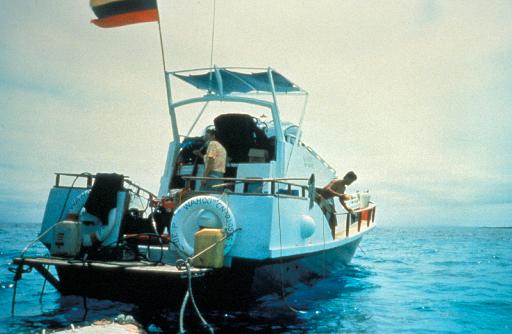What is an oceanographer?

© NOAA
Outer space is not the only "last frontier." In fact, 98 percent of the ocean's floor remains unexplored. Oceanographers study the Earth's oceans and seas, their contents and surrounding environments.
If I want to study or have a career in oceanography, what classes should I take in middle or high school?
Take as many Earth science, biology, chemistry, physics, mathematics and computer science courses as you can. English is also important since scientists need to write clearly and communicate their findings to others on a regular basis. You might also find it helpful to take a course in public speaking. Find out what after-school organizations your school has that can help you with a career as an oceanographer, such as Science Clubs. Also consider doing an oceans-focused project for your local science fair and look for summer field experiences at near-by colleges and universities.
At the university level, what courses should I take?
To become an oceanographer, college students need to first follow the undergraduate course of study recommended by various departments in their colleges and universities. Some students first receive a B.S. degree in chemistry, physics or marine biology before going on to advanced degrees in physical, chemical or geological oceanography (among other options). Students will be able to focus more on oceanography-related courses in their advanced degree programs.
What are the educational requirements for becoming a professional oceanographer?
A bachelor's degree in oceanography or in basic sciences is the minimum educational requirement. Students contemplating a professional career in oceanography should consider getting an advanced degree. It is recommended that you start specializing in one of the four oceanographic fields when you start pursuing a graduate degree. The four oceanographic fields are:
- geological oceanography, the study of the structure, creation, evolution, and history of the sea floor;
- chemical oceanography, the study of the chemical composition and properties of seawater, chemical extraction of certain chemicals from seawater, and effects of pollutants on seawater;
- physical oceanography, the study of waves, tides, currents, transmission of light and sound in the ocean, and ocean-atmosphere relationships; and
- biological oceanography, the study of marine life forms and their relationships to each other and the environment.
A Ph.D. is needed for advancement in college teaching and in most high-level research positions.
Where do oceanographers work?
Jobs in oceanography are found in government agencies, private firms, and nonprofit and academic institutions. Government agencies, among which the largest employer is the National Oceanic and Atmospheric Administration (NOAA), hire oceanographers for research and development. Private firms hire oceanographers to search for valuable sea-floor deposits, investigate areas for sea farming, and evaluate natural energy production from waves, currents, and tides. Oceanographers in academic institutions usually work in colleges, universities, and museums.
Where can I find more information on oceanography?
- Geoscience Careers: www.earthscienceworld.org/careers/index.html
- Careers in Oceanography (Office of Naval Research): www.onr.navy.mil/careers/ocean_marine/
- Careers in Earth Science (NASA): kids.earth.nasa.gov/archive/career/oceanographer.html
- Careers in Oceanography (Palomar College): www.palomar.edu.oceanography/links/Careers.html
- Geoscience Salary Information (AGI): www.americangeosciences.org/workforce/currents
